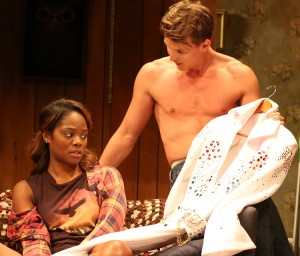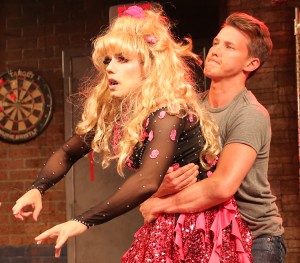The price of fame is at the heart of Kenneth Lonergan’s Hold On to Me Darling, a 2016 play that premiered at the Atlantic Theater Company, directed by Neil Pepe. In Pepe’s superbly cast revival, Adam Driver now plays the main character, Strings McCrane, a renowned but feckless country and western singer who enjoys casual romantic relationships but wants more.
Dressed to Cross
Matthew Lopez, best known for The Whipping Boy, an intense drama about slavery and the Civil War, could hardly have followed it with something more different than The Legend of Georgia McBride, a confection of spangles and sass at the Lucille Lortel Theatre. The new play is a farce in the vein of La Cage aux Folles and Tootsie, leavened with some obvious sermonizing about finding one’s inner self and celebrating the indomitability required to wear a dress and padding—sort of “Climb ev’ry mountain, find ev’ry frock.” It’s good fun, and there are plenty of laughs, but it’s also predictable. Uptown, for instance, an empowered drag queen saves a whole factory full of straight people by manufacturing irrepressible footwear.
Skillfully structured by Lopez, and well-directed by Mike Donahue for MCC Theater, Georgia McBride follows a young married man, Casey (Dave Thomas Brown), who can’t manage to support his wife, Jo (Afton Williamson), by performing as Elvis. When they’re about to be evicted from their home because they’re behind on their rent, and Jo is pregnant, the irresponsible Casey reassures Jo with “We’ll figure it out."
Under Tracy’s tutelage, Georgia starts as an ugly duckling but becomes a star. In typical farce fashion, however, Casey doesn’t tell his Jo what he’s up to. He just hands her the increased income and explains that bookings of heavy metal bands have increased profits at the bar, which is 40 miles from their home. Eventually, of course, Jo finds out everything, and there’s some dramatic hand-wringing about whether she will leave him, but none of it rings true, and Williamson in the thankless role can’t do much to invest it with suspense.
The cast is mostly outstanding. Nobbs plays two roles, and as Rexy he’s not really convincing as a woman, unless you think “roller derby.” (The idea that Rexy could pull off Piaf is ludicrous.) But as Casey’s henpecked neighbor Jason, the actor shows why he’s one of his generation’s outstanding artists. A highlight of the production is Jason’s recollection of his dating “a gender nonconformist” that Nobbs imbues with nostalgia, rue and gentle humor.
McGrath as Tracy has the showiest role, and he seizes it with relish, by turns sympathetic, caustic, disdainful, but most often indomitable. He has the fun of dropping most of the inside references: to Stephen Sondheim (Company, Sweeney Todd and West Side Story), What Ever Happened to Baby Jane?, and Auntie Mame, among many others.
Anita Yavich supplies all the explosions of color one expects from drag costumes—and there are plenty of them—and Ben Stanton’s lighting is sometimes subdued, sometimes garish, and always fun. Donyale Werle has contributed a set that screams “sleazy white trash.” (It’s a stereotype that Lopez indulges in as well, when Jason speaks of his wife and children: “There were rumors we had some cousins in common, and now I think that might have been true.”)
All in all, The Legend of Georgia McBride covers well-tilled ground, but has enough wit and wisdom of its own to make a visit pleasurable.
The MCC Theater production of The Legend of Georgia McBride runs at the Lucille Lortel Theatre (121 Christopher St. between Bleecker and Hudson Sts.) in Manhattan through Oct. 11. Evening performances are at 7 p.m. on Tuesday and Wednesday, and 8 p.m. on Friday and Saturday, with Thursday evening performances at 7 p.m. on Oct. 1, and at 8 p.m. on Sept. 24 and Oct. 8. Tickets may be purchased by calling 212-727-7722 or visiting www.mcctheater.org.









